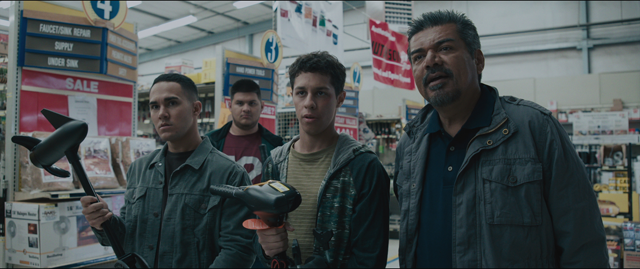Spare Parts is the epitome of a mildly pleasant feel-good story

‘Spare Parts’ tells the true story of some inspiring teens but doesn’t really rise to anything truly memorable.
The problem with true stories is that they are rarely simple. When you construct a fiction, you can add in story beats as you like, emphasize some themes and minimize others. If you don’t like a character, you don’t need to include them. But when you are writing about reality, it’s different. It’s impossible to be comprehensive, to discuss every real life facet of whatever event you’re talking about. So no matter what, some things get left out. And the “based on a true story” line is sometimes even more dangerous, because there’s always the temptation to throw in some “Hollywood friendly” story elements that aren’t really relevant, or drama that may overlook legitimate problems. This is sort of a long way of saying that it’s easy to screw it up. And … that’s sort of the case here.
Spare Parts is based on the real life story of four undocumented Mexican American students in Phoenix, Arizona. There are two primary characters here, the teacher and student, although there is just a bit, just a bit, of the other three students. Oscar (Carlos PenaVega) is a proud member of the ROTC in high school, but discovers that the military isn’t really interested in enlisting an undocumented immigrant, even one who’s basically grown up in the US. Not only that, but it may draw unwanted attention from US Immigration and Customs Enforcement (ICE). We hear a few times about how deported family members hurt and impact these characters. Sometimes we even feel it instead of being literally “told” it.
But back to it; now that Oscar’s chance to help support his family the way he planned is gone, he stumbles across the idea of entering a contest. Apparently NASA is sponsoring a national robotics competition and is looking for the best water robot around (by high school or college students). So this first part of the movie is about the trials and tribulations of Oscar building his team of misfits and oddballs while also letting co-producer George Lopez do a quasi-dramatic, mildly comedic role as a teacher/mentor. George plays Fredi Cameron, a combination of the two real life teachers (scriptwriting for you) and Marissa Tomei plays a random female teacher that provides plot-required assistance. Her character was useless, because she was merely there to increase drama or attempt (and fail) romantic tension. Nothing against her, but the two have no chemistry and her character is written very flat.
Jamie Lee Curtis plays the “Lady Principal” who’s “Tough But With a Heart,” and she has some funny lines. But these are the background characters. There are three other boys on the team: brainy, weird Cristian (David del Rio), bad boy mechanical whiz Lorenzo (Jose Julian), and really big guy Luis (Oscar Gutierrez). Luis has no real story arc to speak of, and Cristian is basically just the nerdy bullied kid who gets slowly minimized as the movie continues. We do see some character beats between Lorenzo and his difficult father (Esai Morales), predictable but mildly moving. There’s some artificial drama, and some drama that feels real. The more interesting stuff (to me) is watching these kids struggle through low budgets and technical limitations to achieve great success.
But man, I didn’t think George Lopez had the “chops” for the character he was playing. He was okay, I guess, but I didn’t really buy it. Plus his romantic subplots were pointless and meh. Oscar is the primary point of view of the kids, driving the story forward because he has a legitimate desire to achieve something for his family. But unfortunately, although we get some “hitting over our heads” political talk about the problems of undocumented immigrant children, it’s really subsumed by the overly melodramatic story beats. I did some research after seeing the movie, and discovered that the real life kids had some significant problems due to current laws, but that’s only slightly touched on in a postscript note. That’s the difficulty here; you want that happy (true) ending, but you also want the “message” — undocumented kids deserve a chance too — to sink in. With all that, this movie is too forgettable for anything real, and will be quickly forgotten until it comes out on Netflix.
It’s not bad, but it’s not special.
 CliqueClack
CliqueClack